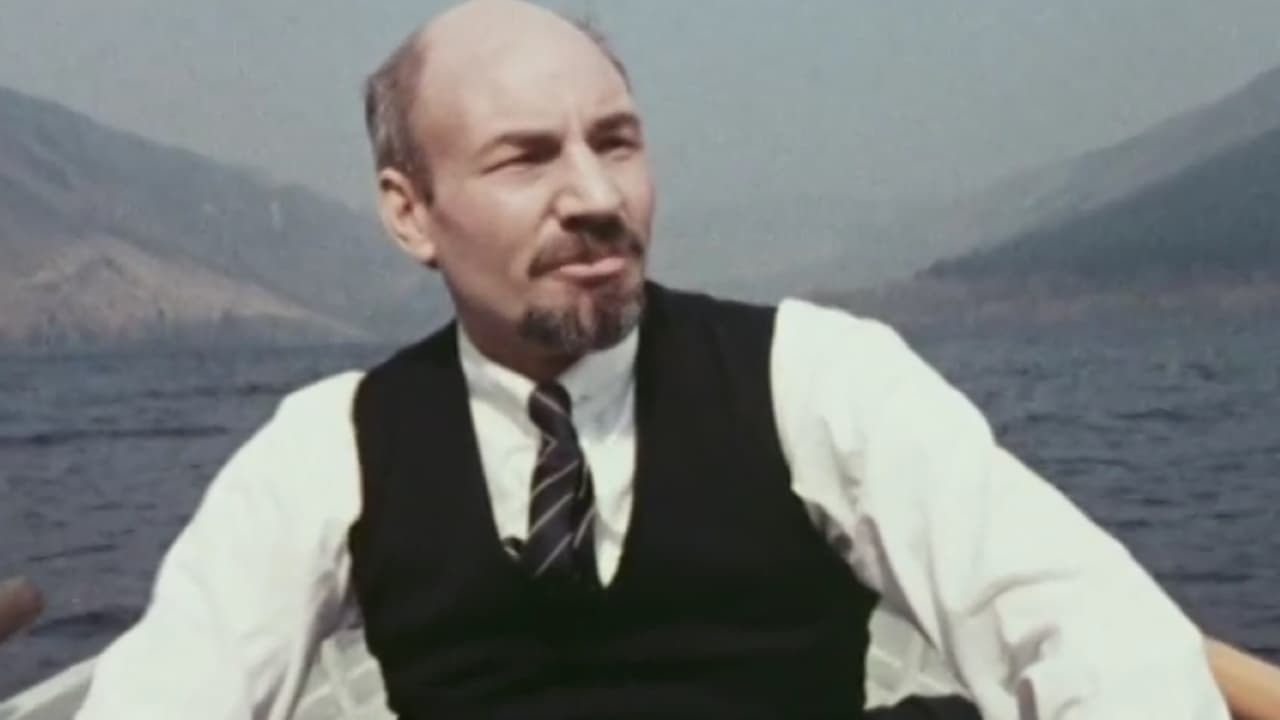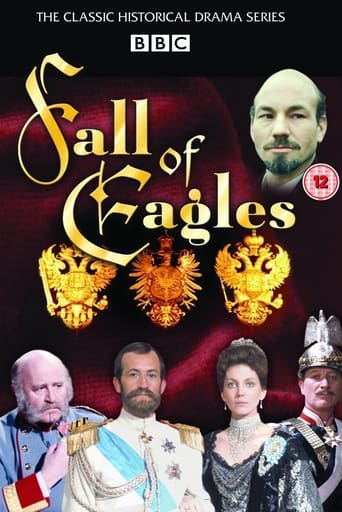

A low budget is no excuse for a complete snooze fest.This series is a drama about European monarchies leading up to World War I. This is not action, but drama. Does that excuse poor directing? No.Three directors (four, if you include Burge), and three writers made this. That may partly account for the ineptness, since creativity cannot be made by committee. By definition, a committee cannot possibly generate any suspense or interest, because a committee will always be safe and predictable.I have worked under dozens of stage directors who could bring life to dull pieces with no action. I have directed dramas that needed life brought to them. There are tricks and methods to enliven scenes. The onus is not on the writers Eliot, Holford, and Pulman (although their dialog was super boring, and they could have done much better), but ultimately the blame for this failure must lay on the shoulders of directors Cunliffe, Hays, Cartier, and Burge. They try to enhance one scene with a man shooting birds, but even that drags in pity.And to top that off, the writing is so horribly done, that we cannot follow what is going on. There is only confusion. We have no idea what is going on, or what a single character is speaking about.There is no way to stay awake for this series. And I am not speaking about the video game arcade audience. I am speaking about intelligent and educated people who love History and read nonfiction. I don't want mindless action, but you can't convey character and story just by delivering lines, either. I can't envision any person being able to sit through this horribly produced thud. I saw some comments that I couldn't believe. This series gives new meaning to the word "drag".
... View MoreAlways hated the dryness of History, but loved this. I never really understood how one assassination could trigger nations falling into World War I or why 'bad guys' do what they do. But watching this series I found myself engrossed in the clash between altruistic principles on all sides. How could everything go bad so quickly when everyone was devoted to 'doing the right thing'? Fall of Eagles begins its tempo with the slow idyllic personal lives of the ruling class and its petty complications and entanglements; gradually meshing it with the encroaching confusion of revolutions in Western Europe; adding deceptions of divided loyalties throughout governments and bids for power. These themes are kept entertaining with cutaways to what each side is doing concurrently and then returning.In some episodes, watching WWI take form was like watching an impending train wreck and not being able to stop it. What makes this series so remarkable are believable characterizations utilizing letters and private/secret documents. The series was successful in avoiding simplistic blame, or championing underdogs, portraying instead real people following their principles to inevitable conclusions. Even catastrophic attempts at damage control made sense in the perspective by which it was made, regardless of class. Particularly intriguing was the sense that no one wanted war, but everyone from aristocrat to politician to peasant was sucked haplessly into it like some kind of circling drain. It really was world misery, plunging reform through the heart of tradition even while they both lay bleeding.My only difficulty was keeping track of alliance marriages and names and titles associated with their countries. More than once, a repeat viewing of an introduction was in order. It would have been nice to have a family tree handy to sort everyone out. The series did do a fine job of seamlessly weaving close ups of changing empire boundary maps into the storyline. Very, very enjoyable history lesson.
... View MoreWhen this series was re-broadcast on the old Bravo network, I managed to record several of the episodes on VHS tape, watching and re-watching the copies till the tape ran snowy and hard to hear. I longed for the day when I could watch the entire series from start to finish in crisp DVD clarity. My wait is ended, I am rewarded. This monumental series full of passion, intrigue, historical goodies, court gossip and protocol is just as fresh as the first time it was broadcast in 1974. Beginning in the mid 1800's and ending with the Kaiser's abdication and exile in 1918, this sweeping melodrama covers all the salient points of political and private machinations that led to the destruction and self-immolation of the three great houses of Europe, the Hapsburgs, Hohenzollerns and Romanovs.Patrick Stewart (Vladimir Lenin, Sejanus in I, Claudius, Captain Jean Luc Picard on Star Trek, the Next Generation) heads a wonderful cast including Curt Jurgens(Otto Von Bismark),Laurence Naismith (Emperor Franz-Josef of Austria-Hungary), Charles Kay (Czar Nicholas Romanov of Russia, also Asinius Galus in I, Claudius), Freddie Jones(Witte), Rosalie Crutchley (Mihail, also Catherine Parr in Six Wives of Henry VIII), Barry Foster(Kaiser Wilhelm II of Prussia), and Gayle Hunnicutt(the Empress Alexandra Federovna of Russia). John Rhys-Davies (Zinoviev, also Macro in I, Claudius) and others easily recognized for various character roles in I, Claudius, Six Wives of Henry VIII and Elizabeth R show their flexibility and talent and act up a storm in this, the ultimate costume drama period-piece.The DVD set is beautifully packaged in a fold open series of 4 discs with tasteful decoration The color is outstanding, the sound almost perfect save for a few variations in volume from one episode to the next, a mere trifle.Every teacher of European History or World History should have this set in their collection, not only for historical content but also for the inexorable march of the familial conflicts toward the ultimate conflagration and destructive event of World War I. It is surprising that the 3 houses, bound by family and blood ties could pull each other to pieces as they did. Beginning with the overbearing and domineering Sophie, mother to the soon-to-be Emperor Franz-Josef,and his doomed son Crown Prince Rudolph (The Mayerling incident is played in delicious detail), then the increasingly enfeebled Kaiser Wilhelm I, and his son-and-heir the doomed Fredrich III, eventually succeeded by the megalomaniacal Kaiser Wilhelm II who led his country to doom in World War I, and the reluctant heir-apparent Nicholas, weak and milquetoast son of the brutish Alexander III who let his country slip through his fingers, dominated by the religiously crippled and pathetically distracted Alexandra, cursed with a hemophiliac son and heir Alexis, ending with the Bolshevik triumph in Russia, the disappearance of the Hapsburg dynasty after the assassination of Archduke Franz-Ferdinand in Sarajevo and the abdication of the Hohenzollern monarch Kaiser Wilhelm II.I highly recommend this DVD set to any collector of historical drama. It is the finest in BBC entertainment of the early 70's, and well worth the wait.
... View MoreThere is a scene in Fall of Eagles, when the German General Ludendorff falls into a fit of rage, screaming "Traitors! Traitors!" Ludendorff will appear later in history, near a certain beer hall in Munich, with an equally enraged colleague, who will visit upon us another world war.After thirty years, BBC have finally released Fall of Eagles on DVD. What's more, they've done it right, with a beautiful transfer. This elaborate production presents the defining event of the twentieth century, the Great War (World War I), from the points of view of those who brought it about and were themselves consumed by it. Some may regard Fall of Eagles as soap opera, and it is indeed staged like one, with almost all the scenes shot indoors. However, British television has always worked well within this constraint, as in I Claudius and Elizabeth R. The sets are magnificent and varied, shot in and around some imposing locations. The costumes are lavish and intricate, making me appreciate how "dressing the part" in those times could be called part of one's duty. I can't imagine how the women managed.Except for Patrick Stewart, Barry Foster, Michael Kitchen, and Gayle Hunnicutt, the cast is made up of character actors unfamiliar to non-British audiences, especially when hidden by beards and mustaches. However, the depth of talent in this huge cast is striking, with convincing portrayals, from the walk-ons to the leads. The producers also should be praised for running a tight ship, which could easily have become an unwieldy mess, due to the parallel and complex events, the 13-episode length and the fact that the directors varied from one episode to the next.Though the story is made up of undocumentable private dialog (except perhaps via diaries), skillful writing, directing and acting create an intimacy that makes one truly to feel like a fly on the wall. Some of the scenes are indeed contrivances. For example, the future empress of Russia, Alexandra, is told by the current empress Marie Dagmar about her concern, that she, Alexandra, wife of the future Emperor, is not Russian Orthodox but German Lutheran. This should not have concerned the old Empress, since she herself was a Danish Lutheran who had converted and was embraced by the Russians. Alexandra not only converts to Russian Orthodoxy, but does it with a militancy that's downright, well, German. Though such an exchange probably wouldn't have taken place, it serves the historical and dramatic purpose of establishing religion as a major factor in the fate of the Romanov dynasty. Alexandra had something to prove, and she did so with a disastrous vengeance. Another value of apocryphal scenes like this is to portray characters as real people, rather than mere "names on a page".Through the intimacy of these private scenes, we can see how the lack of detachment from their own affairs and complete detachment from the affairs of their subjects is the central thesis of Fall of Eagles: that mundane concerns and banal motives in an age of romantic excess, drove monarchs, ministers and consorts, who in turn drove history. Oh yes, did I mention the word "hubris"?Do not let the length of Fall of Eagles put you off. This is one of those wonderful viewing experiences, so rich, so deep, that while watching it the first time, you resolve to watch it again, because you know that characters and events will fall into place, in a seamless, poignant, often maddening saga of real people, caught up in real events, rushing like lemmings to their dooms or, in one case, to a pitiful denouement.And speaking of the Kaiser, Fall of Eagles is not just a routine chronicle of events, but a particular interpretation of history, not only in its choice of dialog but in its perspectives and emphasis. For example, the actual trigger of the Great War depicted here is more complex than what you may recall from your generalized history lessons. So, yes, there is a bit of revisionism here -- that the Kaiser by no means bears sole responsibility for this tragedy -- which you may or may not be inclined to accept. (As a history buff, I do.) Though Fall of Eagles is conventional, i.e. top-down, in perspective, it makes clear that history is not only driven by individuals in power but by the currents and events confronting them. If you are truly concerned about how we got where we are today, you owe it to yourself and your children to witness this amazing epic.__________________Further thoughts:1. There are two soundtracks, one for the opening credits, the other for the end credits. (Opening theme is Mahler, I think.) Both are in perfect accord with their subject, the closing music, in particular, a chilling depiction of the title. 2. There is an indispensable program guide included with the DVD. Each episode is supplemented by well-written capsule biographies. There's even a genealogical chart to help keep the dynasty members and their relationships (one might say incestuous relationships) straight in our minds. 3. There are three interviews with two players (not including Patrick Stewart, alas) and a director. Gayle Hunnicutt, in particular, stands out for her insightful observations.
... View More